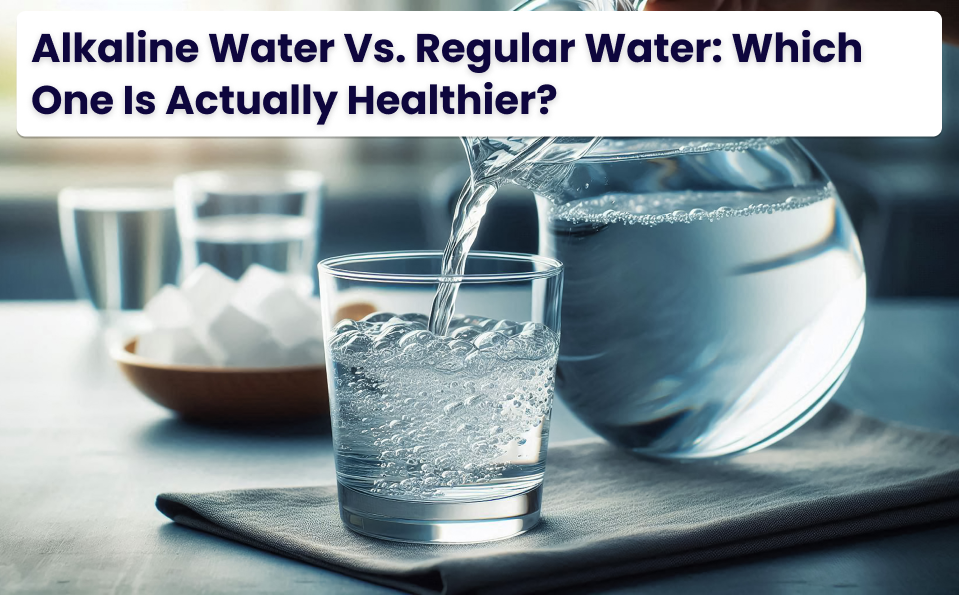
Alkaline Water vs. Regular Water: Which One is Actually Healthier?
Staying hydrated is crucial for maintaining good health, but with various types of water available today, choosing the right one can be overwhelming. Among these options, alkaline water has gained attention for its potential health benefits. But is it better than regular water, or is it just another health trend?
In this blog, we’ll explore the differences between alkaline water and regular water, discuss their benefits and risks, and help you decide which one suits your needs.
What is Alkaline Water?

Alkaline water has a higher pH level than regular tap water. The pH scale ranges from 0 to 14, with 7 being neutral. Regular water typically has a pH of around 7, while alkaline water has a pH of 8 or 9.
- Natural Alkaline Water: Formed when water flows over rocks, picking up minerals such as calcium, magnesium, and potassium.
- Artificial Alkaline Water: Created using electrolysis, a process that increases pH levels with the help of a water ionizer.
What is Regular Water?

Regular water, often referred to as tap water, is neutral with a pH of around 7. It is treated to remove harmful contaminants and is safe for drinking. Regular water may contain essential minerals and additives like chlorine or fluoride, depending on its source and treatment process.
Benefits of Alkaline Water
1. Improved Hydration
Alkaline water is believed to provide better hydration due to its smaller molecular size, which may be absorbed more efficiently by the body. This can lead to improved energy levels and faster recovery from workouts.
2. Relief from Acid Reflux
Studies suggest alkaline water with a pH of 8.8 can help deactivate pepsin, the enzyme responsible for acid reflux. This may relieve symptoms like heartburn.
3. Antioxidant Properties
Alkaline water may have antioxidant effects, potentially neutralizing free radicals in the body. This could reduce inflammation and promote better overall health, although more research is needed to confirm these claims.
4. Bone Health
Alkaline water contains minerals like calcium and magnesium, which are essential for maintaining bone density and reducing the risk of osteoporosis.
Risks of Alkaline Water
1. Over-Alkalinity
Excessive consumption of alkaline water can upset the body’s natural pH balance, potentially leading to digestive issues like bloating and indigestion.
2. Lack of Regulation
The production and sale of alkaline water are less regulated compared to tap water. Some products may lack the advertised minerals or contain unnecessary additives.
3. High Costs
Alkaline water is often more expensive than regular water. Whether you purchase bottled alkaline water or invest in a water ionizer, the costs can add up quickly.
Benefits of Regular Water

1. Cost-Effective
Regular tap water is inexpensive and easily accessible. Many municipalities also add fluoride to promote dental health by preventing cavities.
2. Provides Essential Minerals
Depending on its source, tap water can contain essential minerals like calcium and magnesium, which are beneficial for your health.
3. Natural pH Regulation
The human body is highly capable of regulating its own pH levels through the kidneys and other organs. Drinking regular water is sufficient for staying hydrated and maintaining overall health.
FAQs
1. Is alkaline water safe to drink daily?
Yes, but moderation is key. Drinking too much alkaline water may interfere with your stomach’s natural acidity and digestion.
2. Can alkaline water help with weight loss?
While there’s limited evidence, staying hydrated—whether with alkaline or regular water—can aid weight loss by improving metabolism and reducing appetite.
3. Does regular water lack health benefits compared to alkaline water?
No, regular water provides adequate hydration and often contains essential minerals. For most people, it’s a reliable and cost-effective option.
4. Which water is better for exercise recovery?
Alkaline water may help with hydration and recovery after intense workouts, but regular water is usually sufficient for most individuals.
Summary: Which is Better for You?
While alkaline water may offer benefits like better hydration and relief from acid reflux, the scientific evidence supporting its superiority over regular water is still limited. For most people, regular water is more than adequate for staying hydrated and maintaining good health.
Ultimately, the choice between alkaline water and regular water depends on your personal preferences, health goals, and budget. If you enjoy the taste of alkaline water and feel it enhances your lifestyle, you can incorporate it into your routine. However, regular water remains a healthy, affordable, and accessible option for everyday hydration.